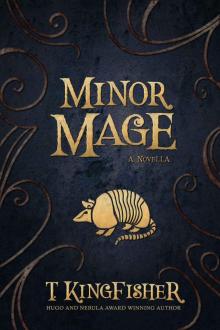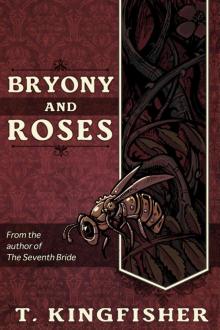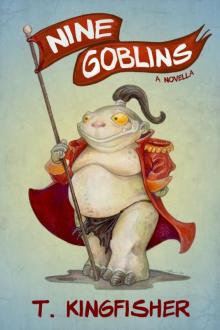- Home
- T. Kingfisher
The Halcyon Fairy Book
The Halcyon Fairy Book Read online
© 2016 by Ursula Vernon.
Dust jacket illustration © 2016 by Ursula Vernon.
Dust jacket design by Ursula Vernon and Sheila Perry.
Interior art © Ursula Vernon.
Ursula Vernon’s annotated fairy tales were originally posted to her blog between February, 2012 and July, 2013, with the exception of “King of Love” which is original to this anthology. They have been lightly edited from their initial postings. Toad Words was originally published as an eBook by Ursula Vernon / Red Wombat Tea Company in 2014. Ursula Vernon can be found online at redwombatstudio.com (T. Kingfisher can be found online at tkingfisher.com).
PRINTED IN THE UNITED STATES OF AMERICA.
ALL RIGHTS RESERVED.
NO PART OF THIS BOOK MAY BE REPRODUCED IN ANY FORM OR BY
ANY ELECTRONIC, MAGICAL OR MECHANICAL MEANS INCLUDING
INFORMATION STORAGE AND RETRIEVAL WITHOUT PERMISSION
IN WRITING FROM THE PUBLISHER, EXCEPT BY A REVIEWER,
WHO MAY QUOTE BRIEF PASSAGES IN A REVIEW.
FIRST EDITION, January 2017
NESFA Press is an imprint of, and NESFA® is a registered
trademark of, the New England Science Fiction Association, Inc.
ISBN: 978-1-61037-326-5 hardcover
ISBN: 978-1-61037-317-3 Ebook
FIRST E-BOOK EDITION, JUNE 2017
Contents
The Annotated Fairy Tales
Introduction
The Blue Light
The Master-maid
The Crystal Casket
The Wonderful Sheep
The Wonderful Birch
The Golden Apple Tree and the Nine Peahens
The Deer Prince
Two Cinderellas
The Story of Log
Tatterhood
The Seven Doves
The King of Love
Toad Words and Other Stories
Introduction
It Has Come To My Attention
Toad Words
The Wolf and the Woodsman
Bluebeard’s Wife
Loathly
The Sea Witch Sets the Record Straight
Never
Bait
Night
Boar and Apples
Odd Season
Acknowledgements
Editor’s Afterword
Technical Notes
THE
ANNOTATED
FAIRY TALES
Introduction
ONCE upon a time there was an author who couldn’t sleep.
I am plagued with occasional fits of insomnia, and when I can’t sleep, I often find myself reading fairy tales. There’s something very soothing about them ... well, usually.
But at one point, in the small hours of the morning, I found myself reading a story and thinking “Wait, what? This doesn’t make any sense! And not in the usual way that fairy tales don’t make sense!”
I am a blogger, for my sins, and I went online to write about my reaction to this story for whatever other souls were awake at 3 am and wanted to know my thoughts about fairy tales and cannibals and whatever other things were rattling around in my brain at that hour. And so, the first of the annotated fairy tales was written, and readers started asking for more.
It wasn’t hard to oblige. Fairy tales are full of magnificent imagery and baffling behavior. I wrote quite a number of them over the years, and when Arisia asked to reproduce them in this volume, I was delighted to oblige.
Alas, two of the stories could not be included, owing to copyright — the specific translations were not yet public domain. So if you run across occasional mentions of twenty-four headed otters, know that it belongs to a truly wonderful story called “The Hog Bridegroom.” My gratitude is immense to the various translators and folklorists who collected these stories, without whom there would be no tradition to comment on.
Also included in this volume, in the second half, is my anthology of fairy-tale retellings previously published under the title Toad Words. I am delighted for it to see print at last as well, and so honored to have my own work in the same volume as those extraordinary writers who gave us the aforementioned tradition of strange and glorious tales.
I hope that you enjoy both halves of the Halcyon Fairy Book, and may we all live happily ever after.
The Blue Light
I frequently find myself online reading fairy tales. And being me, I frequently find myself maintaining a sort of mental running commentary about said fairy tales, and since I am spending today recuperating from Con mode, I have nothing better to do than inflict it upon you!
“The Blue Light” is a folktale of Aaren-Thompson type 562. There’s a half-dozen versions or so. This one’s from Household Stories collected by the Brothers Grimm translated by E. H. Wehnert (London: Routledge, Warne, & Routledge, 1861)
ONCE upon a time there was a soldier who had served the king loyally for many long years. When the war was over and the soldier could no longer serve because of the many wounds he had received, the king said to him, “You can go home now. I no longer need you. There will be no more money for you, because wages are only for those who earn them.”
So, the king’s a dick. Good to know.
Because the soldier did not know how he could earn a living, he sadly walked the whole day long, until he came to a forest in the evening. As darkness fell he saw a light. He approached it and came to a little house, where a witch lived. “Give me a night’s shelter and a little to eat and drink,” he said to her, “otherwise I will perish.”
“Oho!” she answered. “Who gives anything to a runaway soldier? But I will have pity and take you in after all, if you will do what I ask of you.”
Insomuch as there is a moral to fairy tales, it’s that you should always be nice to the less fortunate. You’re probably better off being nice to the less fortunate when they’re animals and old women, however, since there’s an equally large body of folk-songs that detail the hazards of letting soldiers sleep over. In situations like these, the witch pretty much has to flip a coin and hope she doesn’t wind up pregnant.
“What do you want?” asked the soldier.
“For you to dig up my garden tomorrow.”
Ideally you should ask to see the garden first in these cases, as it is entirely likely that it is guarded by ravenous griffins and hip deep in griffin crap.
The soldier agreed, and the next day he worked with all his might, but could not finish before evening. “I see,” said the witch, “that you can do no more work today. I will take you in for one more night if tomorrow you will cut up and split a stack of wood for me.”
Compared to a lot of people, the witch is being very nice about this. The ogre in “The Master-maid” threatened to eat the hero if he didn’t finish by sunset. I’m surprised the witch isn’t bringing him a pillow and some Dr. Scholl’s inserts.
The soldier took the entire day to do this, and that evening the witch proposed that he remain a third night. “Tomorrow I have only a small task for you. Behind my house there is a dry well into which my light has fallen. It burns blue and never goes out. I want you to get it for me.”
I am pretty sure you are not supposed to go into tunnels when the lights start burning blue.
The next day the old woman led him to the well and lowered him down it in a basket. He found the blue light and gave a sign that she should pull him up again. And she did pull him up, but when he was close to the edge, she wanted to take the blue light from him. “No,” he said, sensing her evil thoughts, “I shall not give you the light until I am standing on the ground with both feet.”
Then the witch became furious, let him fall back into the well, and walked away. The poor soldier fell to the damp floor witho
ut being injured. The blue light continued to burn, but how could that help him?
I am not sure if this was a radical about-face by the witch, or if she was planning on killing him the whole time and thought she’d at least get some manual labor out of the bargain first. In some of the other versions, the witch is replaced by a charcoal burner who conveniently dies in his sleep, and in at least one, the witch is a perfectly nice person who gave him piles and piles of money, and the soldier hacks her head off when she won’t tell him what the light is for. But we’ll go with strange soldier telepathy for the moment.
He saw that would not be able to escape death. He sadly sat there for a while. Then he happened to reach into his pocket and found his tobacco pipe, which was still half full. “This will be your last pleasure,” he thought, pulled it out, lit it with the blue light, and began to smoke.
You lit a fire in a tunnel where the flames were burning blue. By rights you should be spread all over the landscape in an inch-thick layer of goo.
After the fumes had wafted about the cavern, suddenly there stood before him a little black dwarf, who said, “Master, what do you command?”
“Why should I command you?” replied the bewildered soldier. “I must do everything that you demand,” said the dwarf.
The plot thickens!
“Good,” said the soldier, “then first help me out of this well.”
The dwarf took him by the hand and led him through an underground passage, and he did not forget to take the blue light with him. Along the way he showed him the treasures that the witch had collected and hidden there, and the soldier took as much gold as he could carry.
In some of the other versions, the dwarf is replaced by a man made of iron, and in about half of them, it’s a trio of dogs, with eyes as big and round as a series of big round things. (Millstones, towers, etc.) My mental image of the dogs with huge eyes involved a series of mutant pugs and was a trifle unsettling. Pugs already have that problem with their eyes popping out when they sneeze too hard or get whacked in the back of the head, and if you’ve got eyes like millstones, I imagine you don’t even dare swallow hard. And good luck catching THAT in a wet towel and taking the dog to the vet. They’d have to be like those freaky Margaret Keane animals. Let’s stick with the dwarf.
When he was above ground, he said to the dwarf, “Now go and bind the old witch and take her to the judge.”
Not long afterward she came riding by on a tomcat-as-fast-as-the-wind and screaming horribly. And not long after that the dwarf was back. “It is all taken care of,” he said. “The witch is hanging on the gallows. Master, what do you command now?”
Well, I’ll give the soldier some credit for having the witch sent to the judge instead of having the dwarf kill her out-right. We’ll assume there was a fair trial, as Vaguely Medieval Europe was always so good about that with witches.
I would have liked to know more about the tomcat-as-fast-as-the-wind, though.
“Nothing at the moment,” answered the soldier. “You can go home, but be ready when I call you.”
“It is only necessary,” said the dwarf, “for you to light your pipe with the blue light, and I will be with you.” With that he disappeared before his very eyes.
The soldier returned to the city from which he had come. He moved into the best inn and had beautiful clothes made for himself. Then he told the innkeeper to furnish his room as luxuriously as possible. When it was finished he summoned the black dwarf and said, “I served the king loyally, but he sent me away to starve. For this I now want revenge.”
“What am I to do?” asked the little man.
“Late this evening, when the king’s daughter is lying in bed, bring her here to me in her sleep. She shall do maid service for me.”
I see we’re just going to abandon the moral high ground right away.
The dwarf said, “That is an easy thing for me, but a dangerous thing for you. If you are found out, it will not go well for you.”
The dwarf may be the only person in this story with any sense.
At the strike of twelve the door opened, and the dwarf carried the king’s daughter in.
“Aha, is that you?” cried the soldier. “Get to work now! Go fetch the broom and sweep the room.” When she was finished he called her to his chair, stuck his feet out at her, and said, “Pull off my boots,” then threw them in her face, and she had to pick them up and clean them and make them shine.
I had been wondering if “maid service” was a euphemism. I suppose it could be worse. But my sympathy is definitely gone. I realize that the king’s a dick, but I’m pretty sure his daughter didn’t have anything to do with the military pension situation, and you’re using your amazing magic tinderbox just so you can throw boots at her head?
She did everything that he ordered her to do, without resisting, silently, and with half-closed eyes.
Nothing creepy ’bout that at all.
At the first cock’s crow, the dwarf carried her to the royal palace and back to her bed.
The next morning, after the king’s daughter had gotten up, she went to her father and told him that she had had an amazing dream. “I was carried away through the streets as fast as lightning and taken to a soldier’s room. I had to serve as his maid and wait on him and do common work, sweep the room, and clean his boots. It was only a dream, but still I am as tired as if I had really done it all.”
“The dream could have been true,” said the king. “I will give you some advice. Fill your pocket with peas, then make a small hole in your pocket. If you are carried away again, they will fall out and leave a track on the street.”
The king may be a dick, but this is really rather clever. (In other versions he sees a spot of boot-grease on her face, which explains a little better why he was willing to believe that this was really happening.)
As the king was thus speaking, the dwarf was invisibly standing nearby and heard everything.
Honestly, the dwarf deserves Employee of the Year. You notice that the soldier never thanks him for any of this.
That night when he once again carried the sleeping princess through the streets, a few peas did indeed fall out of her pocket, but they did not leave a track, because the cunning dwarf had already scattered peas in all the streets. And once again the king’s daughter had to do maid service until the cock crowed.
The next morning the king sent his people out to look for the track, but it was to no end, for in all the streets there were poor children gathering peas and saying, “Last night it rained peas.”
Personally I might have just closed up her pocket, but I suppose if one of your superpowers is making it rain peas, you take any chance you can to use it. I would imagine this annoys the heck out of the dwarf ’s friends. “Damnit, Bob! We’re just locked out of the house here! This is not an appropriate situation for the rain of peas!”
“We must think of something else,” said the king. “Leave your shoes on when you go to bed, and before you return from there, hide one of them. I will be sure to find it.”
The black dwarf overheard this proposal, and that evening when the soldier again wanted the king’s daughter brought to him, the dwarf advised him against this, saying that he had no way to protect him against such trickery. If the shoe were to be found in his room, it would not go well with him.
Let me get this straight. The dwarf can make it rain vegetables, go invisible, drag witches off to be tried fairly by a jury of their peers (I am clinging to this one, damnit) and smuggle sleeping women all over town, but if somebody throws a shoe under the bed, he’s powerless?
“Do what I tell you,” replied the soldier, and for a third night the king’s daughter had to work like a maid. But before she was carried back, she hid a shoe under the bed.
Maybe the dwarf is a recovering brownie, and he can’t touch shoes. He’ll lose his mind if shoes get involved. He had to join Shoes Anonymous for recovering fairy cobblers.
On the other hand, it’s a fairy tale, and there ar
e so many red-hot iron shoes, shoes that make you dance endlessly, shoes that cause passing farmhouses to fall on your head, etc, that maybe he’s being quite sensible about this.
The next morning the king had the entire city searched for the shoe, and it was found in the soldier’s room. The soldier himself, following the little man’s request, was already outside the city gate, but they soon overtook him and threw him into prison.
Bet you wish you’d kept that tomcat-as-fast-as-the-wind now, huh?
In his haste, he had forgotten to take along his most valuable things: the blue light and the gold.
Translation: The soldier is too stupid to live. This is not like forgetting to pack your toothbrush.
He had only one ducat in his pocket. Standing at the window of his prison and weighted down with chains, he saw one of his comrades walking by. He knocked on the glass, and as he walked by, he said, “Be so good and bring me the little bundle that I left at the inn. I’ll give you a ducat for it.”
The comrade ran forth and brought back the desired things. As soon as the soldier was alone again, he lit his pipe and summoned the black dwarf. “Have no fear,” he said to his master. “Just go where they lead you, and let everything happen, but take the blue light with you.”
If I were the dwarf, I might be trying to shed this guy by now and go back to my nice well, which isn’t full of ingrates.
The next day the soldier was tried, and although he had done nothing wrong, the judge still sentenced him to death.
No, actually I’m pretty sure kidnapping and throwing boots at the princess for revenge counts as wrong, and there’s still the question of the possibly innocent witch, since I am growing increasingly suspicious of the accuracy of soldier telepathy. Frankly, maybe the witch was the telepathic one and realized what a jerk you are and decided to drop you down the well for a reason.
As he was being led out, he asked the king for one last wish. “What sort of a wish?” asked the king.
“That I might smoke one more pipe on the way.”
“You can smoke three,” answered the king, “but do not think that I will let you live.”

 Paladin's Strength
Paladin's Strength The Twisted Ones
The Twisted Ones The Hollow Places
The Hollow Places Paladin’s Hope: Book Three of the Saint of Steel
Paladin’s Hope: Book Three of the Saint of Steel Swordheart
Swordheart Jackalope Wives And Other Stories
Jackalope Wives And Other Stories A Wizard's Guide to Defensive Baking
A Wizard's Guide to Defensive Baking Minor Mage
Minor Mage The Halcyon Fairy Book
The Halcyon Fairy Book Bryony and Roses
Bryony and Roses The Wonder Engine_Book Two of the Clocktaur War
The Wonder Engine_Book Two of the Clocktaur War Clockwork Boys: Book One of the Clocktaur War
Clockwork Boys: Book One of the Clocktaur War The Raven and the Reindeer
The Raven and the Reindeer Summer in Orcus
Summer in Orcus The Wonder Engine
The Wonder Engine Seventh Bride
Seventh Bride Toad Words
Toad Words Nine Goblins
Nine Goblins